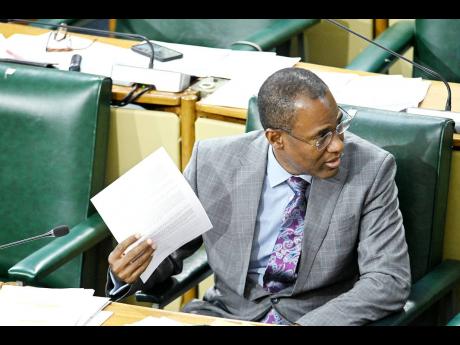Gov’t pushing to make NPO registration mandatory
The Government is taking steps to promulgate legislation to make registration of non-profit organisations (NPOs) mandatory.
This proposed move is intended to plug a gap in the current Charities Act.
Finance and the Public Service Minister Dr Nigel Clarke said on Tuesday that although Jamaica has promulgated the Charities Act and has identified those at-risk charities that should be protected against abuse of being used to finance terrorism, the framework is voluntary.
He said that only those charities that are seeking a tax exemption are not required to register with the regulator of charities.
Clarke told his fellow legislators on Tuesday that the Ministry of Industry, Investment and Commerce has started work to plug this gap. He said a discussion paper has been developed and a Cabinet submission has been drafted and shared with stakeholders for comment.
He said a meeting is to be scheduled to discuss the recommended proposal for a separate piece of legislation as against amending the Charities Act to make registration of NPOs mandatory.
The legislative framework to make the registration of NPOs mandatory is expected to move Jamaica from being partially compliant to compliant with Recommendation 8 under Financial Action Task Force (FATF) rules.
This recommendation is part of 40 FATF recommendations that constitute the international standards by which countries’ jurisdictions’ preventative measures to combat the risks posed by criminals to launder the proceeds of crime and finance terrorism and proliferation of weapons of mass destruction are assessed.
The FATF is the global money laundering and terrorist financing watchdog.
In a statement to Parliament, Clarke said Jamaica was pushing to upgrade three FATF recommendations from partially compliant to compliant.
Jamaica is moving to improve Recommendation 7, which deals with targeted financial sanctions related to proliferation from its current partially compliant status to compliant.
Clarke said Jamaica has promulgated regulations to address sanctions against the Democratic People’s Republic of Korea. However, the corresponding regulations to treat with sanctions for Iran are still outstanding.
He said the Ministry of Foreign Affairs and Foreign Trade has advised that it is working on a second draft of the regulations, having received extensive feedback from the chief parliamentary counsel.
Turning to Recommendation 15, which addresses new technologies, Clarke said Jamaica was assessed as being compliant in 2015. However, he said since that time, the country has seen the advent of virtual assets such as Bitcoin and virtual asset providers (VASPs).
He said that since Jamaica’s framework has not specifically addressed the risks posed by VASPs, its rating was downgraded from compliant to partially compliant.
The FSC, the current regulator for this sector, is spearheading the work to develop draft regulations to govern the VASP sector.
Clarke, in his statement to Parliament, said Jamaica was now compliant in 37 out of 40 FATF recommendations.
Jamaica’s 4th Round Mutual Evaluation, conducted in 2015 by the Caribbean Financial Action Task Force and published in 2017, concluded that the country was compliant or largely compliant in only 17 of the 40 FATF recommendations.
Clarke said that owing to deficiencies in the effectiveness of Jamaica’s anti-money laundering, the counter financing of terrorism (AML/CFT) regime, and due to the size of Jamaica’s economy as measured by a money supply metric that was arbitrarily changed, the country was placed under “increased monitoring and follow-up”, otherwise called grey listing, by FATF.
This resulted in Jamaica committing to a 13-point action plan to address deficiencies in the effectiveness of its regime.
He said only one area remains outstanding to be positively assessed in the action plan and that is the demonstration of the effectiveness of Jamaica’s framework for transparency and beneficial ownership of legal persons.
Clarke said he was optimistic that Jamaica would clear the final hurdle by February 2024 when the FATF determines if the country has effectively implemented its framework for the transparency and beneficial ownership of legal persons thus signalling the substantial completion of the agreed action plan.
Completion of the action plan is a prerequisite for Jamaica to apply to exit FATF’s increased monitoring. The process involves an onsite visit by FATF to confirm the sustainability of the measures taken under the action plan to enhance Jamaica’s AML/CFT regime.

